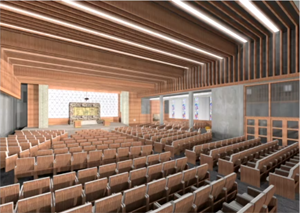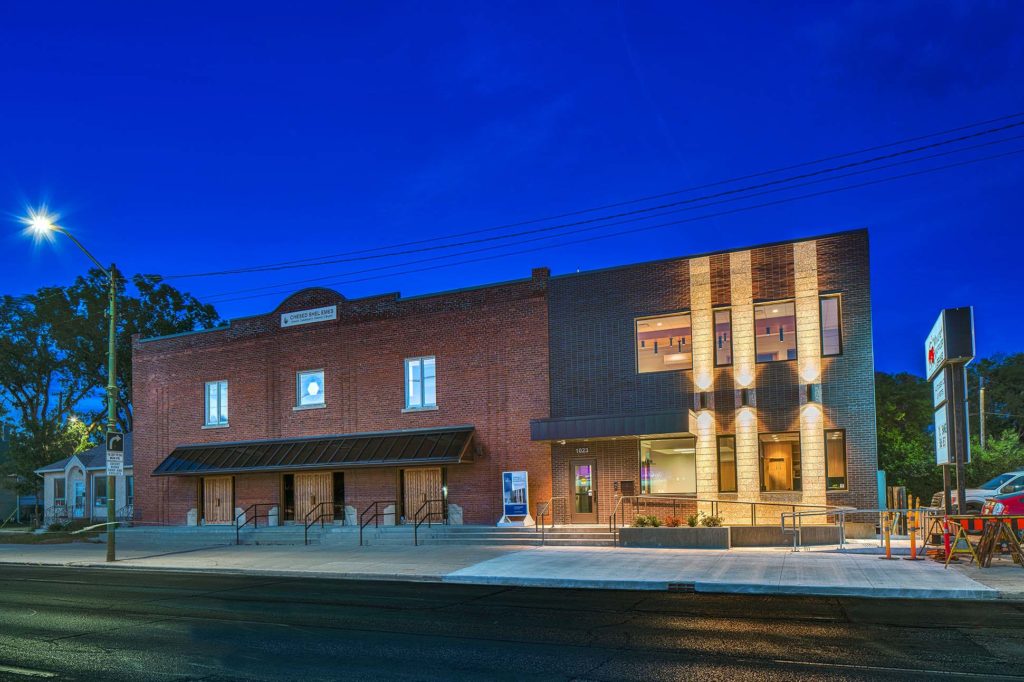Local News
Shaarey Zedek details where it will relocate during reconstruction

On June 30, the Shaarey Zedek released detailed plans of how it will handle operations during the reconstruction of the synagogue. Following is that announcement in full:
Dear Friends,
The number one question we’ve been asked in 2022 is about the relocation of synagogue operations during construction. We appreciate your patience with us — it has been a challenging process to assess options, reach consensus, and negotiate lease terms. Today we are pleased to provide you with the plan! After exploring countless options from commercial spaces to hotels, we chose to keep close to the Jewish community — our new temporary homes will be at Temple Shalom and the Asper Jewish Community Campus, and we will operate there fully beginning Monday, July 25.
Our friends at Temple Shalom (1077 Grant Avenue) have graciously leased us space for:
• Administrative Offices.
• Sanctuary for Daily Minyan (Sunday to Friday, and Saturday Evenings).
• Sanctuary for Funerals and other Life Cycle Events.
• Space for small to medium-sized Programs and Meetings.
Our friends at the Asper Jewish Community Campus (123 Doncaster Street) have also generously leased us space for:
• Friday Evening and Shabbat Morning Services in the Berney Theatre.
• Shabbat Luncheon (Kiddush) in the Adult Lounge or other spaces depending on attendance.
• High Holy Day Main Service in the Gymnasium (will be decorated for ambience).
• High Holy Day Children’s Activities.
• Spaces for some Programs and some Meetings.
• Our Catering and Takeout operations will share space with Schmoozer’s Cafe. We will therefore only offer pareve and dairy-only options for the foreseeable future.
A few other things to know:
• Saturday morning Bar and Bat Mitzvahs will be held at the Berney Theatre. Bar and Bat Mitzvahs that are on other days such as Rosh Chodesh, Thursdays, and Saturday Evenings, will have venue options based upon availability of the Berney Theatre, and Temple Shalom. If you select to have your simcha at a hotel or other venue, we will now provide clergy to officiate the service. We have also invested in new audio and visual equipment so we can be flexible for your event and offer streaming almost anywhere. The catering we can offer at hotels and other venues will be based upon their policies and your independent arrangements with them. For instance, you may be able to order desserts from Shaarey Zedek that we can deliver to the facility, but the venue will cut and serve.
• Funerals will continue to be offered graveside as they always have, and at Temple Shalom with our clergy team. We will not have funerals at the Asper Jewish Community Campus. We do not have a set location for Meals of Consolation; however, we can provide options based upon availability or cater at a venue you privately arrange such as a house, condo/apartment lounge, or other location.
• Sisterhood Gift Shop will become virtual! An online store is being developed so you can select and pay for items – then pick them up from our administrative offices at Temple Shalom when we receive them, or we can ship to you for a fee.
Our staff are beginning to pack offices, and we are working with a company to assist in packing up, moving, and storing items. Much care will go into packaging our ritual items, and historical artifacts and documents.
Important Dates:
• Week of July 17 – Administrative offices will transition to Temple Shalom. It is best to email or call us first before coming to Shaarey Zedek or Temple Shalom as there will be downtime as we set up our workstations, network, and equipment. Updates will be posted on the main page of our website.
• Saturday, July 23 – The final in-person Shabbat Morning Service at Shaarey Zedek will be at 10:00 AM.
• The final in-person Daily Minyan at Shaarey Zedek will be at 6:00 PM.
• Sunday, July 24 – Morning and Evening Minyan will be virtual only as we transition equipment to Temple Shalom.
• Monday, July 25 –
• Our first in-person Daily Minyan Services will take place at Temple Shalom – Morning Service at 7:30 AM and Evening Service at 6:00 PM. Our service schedule will remain the same but will be held at Temple Shalom from that day forward.
• Administrative offices open officially at Temple Shalom.
• Saturday, July 30 – Our first in-person Shabbat Morning Service will be at the Berney Theatre at 10:00 AM.
All the above updates will be posted on our website, social media, and reminders will be sent by email. Additional information will also be sent out in July.
The combined efforts of our professional team and volunteers to make this transition happen has been significant. Many hours of work and the unwavering commitment of our group has brought us to this point and will continue to propel us forward. We appreciate your commitment to the congregation, this project, and thank you for your patience with us.
Local News
Thank you to the community from the Chesed Shel Emes

We’re delighted to share a major milestone in our Capital Campaign, “Building on our Tradition.” Launched in November 2018, this campaign aimed to replace our outdated facility with a modern space tailored to our unique needs. Our new building is designed with ritual at its core, featuring ample preparation space, Shomer space, and storage, creating a warm and welcoming environment for our community during times of need.
We’re grateful to the nearly 1,000 generous donors who contributed over $4 million towards our new facility. A $750,000 mortgage will be retired in November 2025, completing this monumental project in just seven years.
We’re also thrilled to announce that our Chesed Shel Emes Endowment Fund has grown tenfold, from $15,000 to $150,000, thanks to you, the Jewish Foundation of Manitoba’s FundMatch program, and Million Dollar Match initiative in 2024. Our fund helps ensure that everyone can have a dignified Jewish funeral regardless of financial need.
As we look to the future, our goal remains to ensure the Chevra Kadisha continues to serve our community for generations to come. Our focus now shifts to replenishing our savings account and growing our JFM Endowment fund.
We’re deeply grateful for your support over the past several years.
It’s our privilege to serve our community with care and compassion.
With sincere appreciation,
Campaign cabinet: Hillel Kravetsky, Gerry Pritchard, Stuart Pudavick,
Jack Solomon, and Rena Boroditsky
Murray S. Greenfield, President
Local News
Winnipeg Beach Synagogue about to celebrate 75th anniversary

By BERNIE BELLAN (July 13) In 1950 a group of cottage owners at Winnipeg Beach took it upon themselves to relocate a one-room schoolhouse that was in the Beausejour area to Winnipeg Beach where it became the beach synagogue at the corner of Hazel and Grove.
There it stayed until 1998 when it was moved to its current location at Camp Massad.
On August 2nd members of the synagogue will be holding a 75th anniversary celebration.

As part of the celebration anyone who is a descendant or relative of any of the original members of the first executive committee (as seen in the photo here) is invited to attend the synagogue that morning.
If you are a relative please contact Abe Borzykowski at wpgbeachshule@shaw.ca or aborzykowski@shaw.ca to let Abe know you might be attending or for more information about the 75th anniversary celebration.
We will soon be publishing a story about the history of the beach synagogue, which is something I’ve been writing about for over 25 years.
Local News
Vickar Family cuts ribbon on new Tova Vickar and Family Childcare Centre

By MYRON LOVE In the words of Larry Vickar, the Shaarey Zedek’s successful Dor V’ Dor Campaign “is not only a renewal of the synagogue but truly a renewal movement of Jewish life in our community.”An integral part of that renewal movement was the creation of a daycare centre within the expanded synagogue. On Monday, June 23, Larry and Tova Vickar cut the ribbon, thereby officially opening the Tova Vickar and Family Childcare Centre in the presence of 100 of their family members, friends and other supporters of the project.
The short program preceding the morning ribbon-cutting began with a continental breakfast followed by a welcome by both Fanny Levy, Shaarey Zedek’s Board President, and Executive Director Dr. Rena Secter Elbaze. In Elbaze’s remarks, she noted that Larry and Tova wanted their family (including son Stephen and family, who flew in from Florida) and friends at the event to celebrate the opening of the Tova Vickar and Family Childcare Centre, “not because of the accolades, but because, as Larry put it, he hopes that their investment in the congregation will inspire others to do the same.”
“When Larry and I spoke about what this gift meant to him and the message he wanted people to take away,” she continued, “I couldn’t help but connect it to the teachings of Reb Zalman Schachter-Shalomi whose book – Age-ing to Sage-ing – changes the whole way we look at the concept of ageing and basing it on our ancestral teachings.”
She explained that his concept of “Sage-ing” is based on three key ideas – Discover your meaning and purpose; accept our mortality and think about the legacy you want to leave.
“Larry spoke about these exact concepts when we met,” she said.
Elbaze also noted the presence of Shaarey Zedek’s newly-arrived senior Rabbi Carnie Rose, former Rabbi Alan Green, and area MLAs Mike Moroz and Carla Compton.
Larry Vickar expressed his great appreciation for all those in attendance. “Tova and I are deeply moved to stand here with you today for this important milestone in our community”, he said. “We are grateful to be surrounded by all of you, the people we care about, our family and friends… you who have touched our lives and played some part in our journey.”
